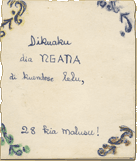“Beloved friends…”

Dear Deolinda,
What a walk through memory lane!
 I celebrated my latest birthday by driving to Philadelphia for a visit with your best friend growing up in Luanda. Loid’Ana and a friend of hers greeted me with one of the most upbeat and swinging versions of “Happy birthday to you” ever sung to me. Oh yes--with that indescribable African beat and harmony that I learned to love so many years ago. Talk about turning back the pages of time!
I celebrated my latest birthday by driving to Philadelphia for a visit with your best friend growing up in Luanda. Loid’Ana and a friend of hers greeted me with one of the most upbeat and swinging versions of “Happy birthday to you” ever sung to me. Oh yes--with that indescribable African beat and harmony that I learned to love so many years ago. Talk about turning back the pages of time!
That was just the beginning of her hospitality, and I was reminded of the many times we missionaries visited homes in Luanda and in villages all over Angola and received the same kind of generous welcome. Sometimes we were invited to feast on goat slaughtered for the occasion of our visit. Or chicken. Once I even suspected monkey--a real test of my gastronomic limits. Nearly always there was funji--the traditional tasty and very filling Kimbundu food that for most of us required real resolve to take the first bite, and sometimes the second, before we successfully swallowed the pasty morsel. It had to be lubricated with some kind of gravy to keep it sliding down to the proper digestive channels.
For Loid’Ana, it was delicious lentil soup that she had prepared as just one of the many gracious acts of kindness to the many people who come to visit her and her sister Mimi in a townhouse near downtown Philly. Mimi’s slowly recovering from a serious illness, and while not a trained caregiver, Loid’ has more than compensated by tending to her needs with ever so loving hands.
My visit coincided with visits by her daughter Maria Juliana, who came from her nearby home as soon as word came that I had arrived. She is married and has a daughter, and is very supportive of Loid’Ana with all the medical and immigration complications of providing for Mimi’s care. And as we visited around the kitchen table, another family connection was made: Raimundo, Loid’Ana’s oldest son, was arriving at the Philadelphia airport after a long flight from Luanda. So off went Maria to pick up her brother, who left Africa without a sign of a jacket or other warm clothing to counter the still chilly eastern U.S. weather.
No matter. The lentil soup was served, and the warmth of the little circle extended to another family member as we talked about our times in Angola.
Raimundo is a musician, and before he arrived Loid’ handed me a couple of his CD’s, where he’s featured as composer, keyboard player and vocalist. Photos of him on the CD covers prepared me for the handsome young man who eventually arrived, still jet lagged but happy to be part of the welcome to this home transferred from Angola.
I took along printouts of some of the memorabilia from you, Deolinda, found during the winter storms, items that my son Arthur helped me scan using modern technology on one of his visits to Baltimore. There were scans of photos of you, too, and Loid’Ana settled in to look at those visual reminders of your time together so many years ago. She, too, was one of the teachers in the day care center we opened in Luanda. She, too, taught the children songs and games, and like you, was devoted to their care.
Since I had arrived on my “faz anos” day (my birthday), one of the first things I showed Loid’ was that little folding card from you decorated with flowery birthday greetings and hand-written in Kimbundu, dated March 28, 1957.
She wasn’t able to be that precise in the translation because as the years have gone by, her memory of her parents’ Kimbundu language has faded. But Loid’ gave me the general meaning of what you had written for me, the young American missionary who had become part of your young life.
Looking back from the perspective of time and possibly accumulation of a bit of wisdom and self-understanding, I realize that, for you, with the aspirations of a bright young woman in her late teenage years, the card was a sincere tribute, but also a kind of starry-eyed way to create opportunities for yourself.
I had one experience along those lines already—in my acquaintances among the Angolan students who studied in Portugal while I was in Lisbon learning the Portuguese language. I was shocked by a proposal of marriage from one of the students at Carcavelos whom I barely knew. What was that all about? I wondered.
But those kinds of thoughts were cast aside as Loid’Ana and I looked over the reminders of those years when the two of you shared friendship and talked about what lay ahead for you as young African women in a culture that was soon to be tried in a whole new and violent way by Portuguese colonial powers.
